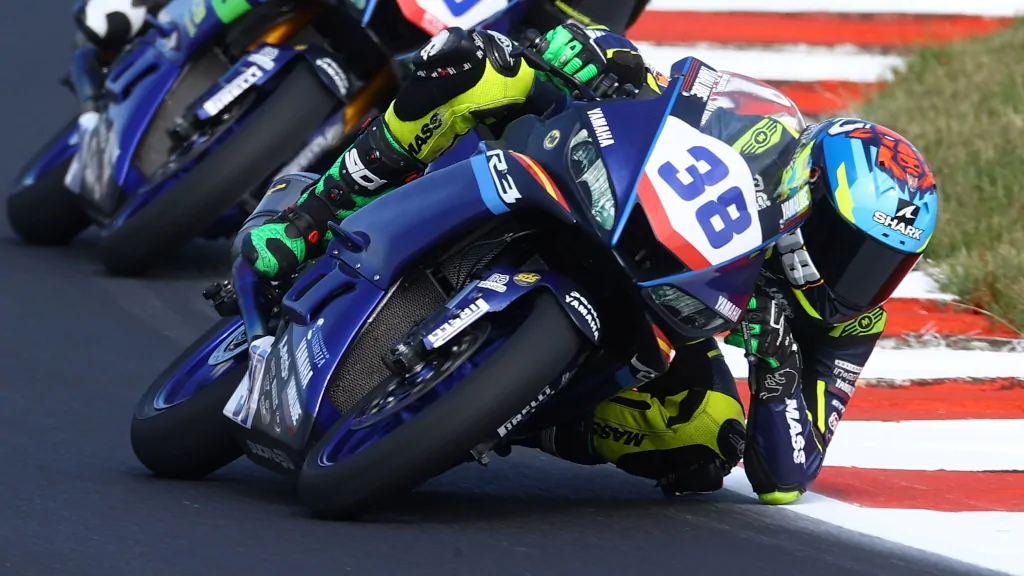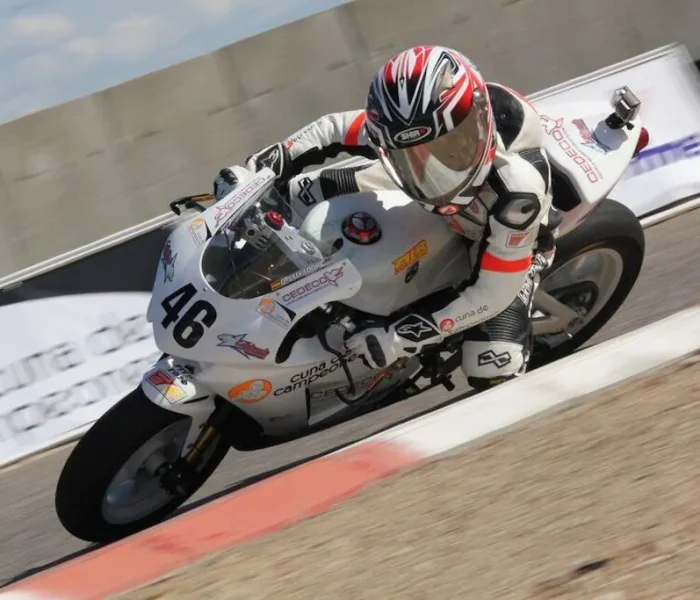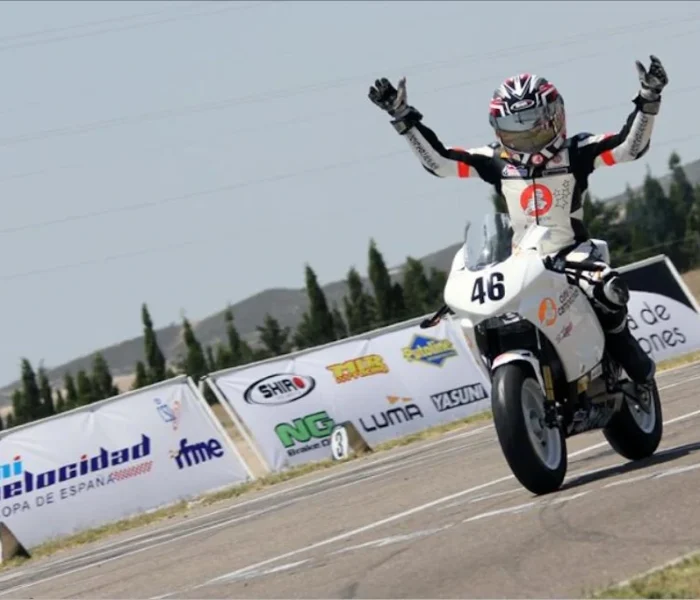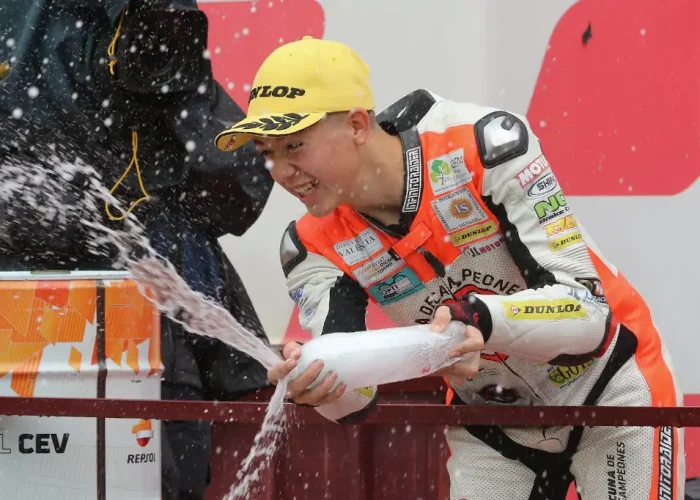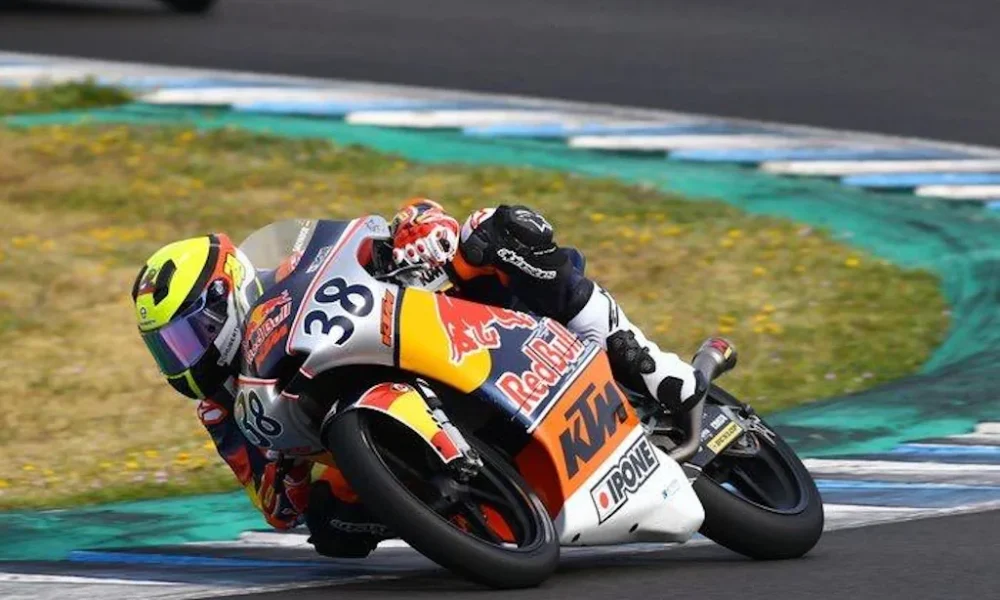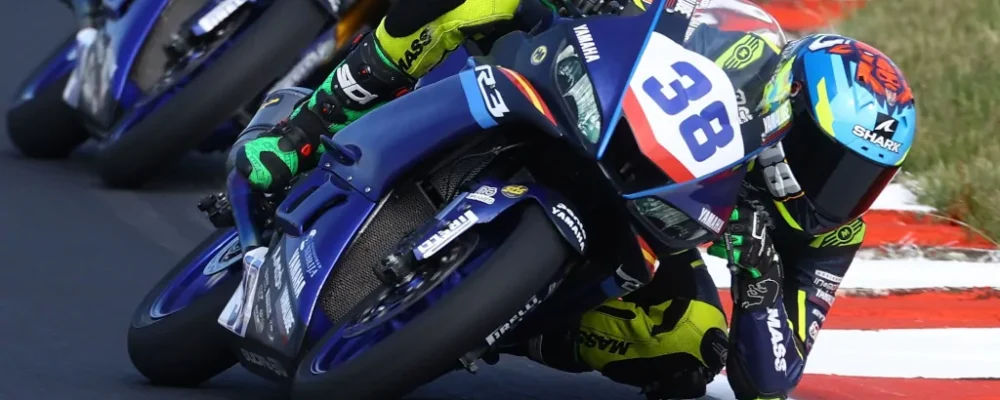
Interview with David Salvador, World Superbike rider
In this interview with David Salvador, World Superbike rider, we have the opportunity to learn about his experience in one of the most exciting competitions in motorcycling. David talks to us about the challenges he faces in each race, his training, and his passion for motorcycles. Join us to discover more about his career, his achievements, and what motivates him to continue pursuing his dreams in the world of Superbikes.
1. David Salvador, despite his young age, has been involved in the world of motorcycling for many years. But... why his passion for motorcycles? How did this passion begin?
«My passion for motorcycles started when I was little. When I could barely walk, I rode a plastic motorcycle; I always got around on wheels. My father was into motorcycles, and they decided to buy me a mini-motorcycle. From a very young age, I ran around the house with the plastic motorcycles and played with them in the kitchen, and one thing led to another.»
2. Tell us about your training routine. How do you prepare physically and mentally for competitions?
«It depends on the time of the season we're in, and we do one type of training or another. During the season, when we have a lot of races in a row, we have to maintain or look for something specific that we have more or that's more difficult for us at that moment, and during the preseason we put in a lot of hours. We do various disciplines, like motocross or flat track, because the weather during the winter is very good, and the risk of injury in the event of a crash is high. So, we always avoid doing those workouts during the season and leave them only in the preseason block, because it's very beneficial. It's a way of touching the bike from a different perspective and gives you a different level of technique.
We also do a lot of gym work and cardio. Depending on the situation, we do intensive cardio or endurance cardio. Ultimately, it's about complementing everything and working hard on a mental level as well. In this case, we do a lot of work during the preseason to analyze the mistakes we've made to understand them and make sure they don't happen again during the season. Above all, we work hard on this aspect every week with our coach and sports psychologist so that when we have a moment where certain things happen that could upset us, we know how to handle it in the best possible way without losing focus or being at the right moment, reading the situation well. It's a daily workout we do, and it's super important for the bike».
3. Any notable scares or anecdotes you've experienced in the world of motorcycles and racing?
«There are many. I remember one at MotorLand Aragón when I was younger and racing in PreMoto3 in the Spanish Championship. I took a big tumble while coming off the back straight, and I remember that because I was so small and because of the tumble itself, I ended up in a concussion. I got up and walked, but I didn't know where I was going. I fell and got up, and I wasn't even sure where I was because of the dizziness I felt and the fall itself. I remember it as if I were suddenly drunk; it's a bit of an anecdote. The team coach was also at that point on the track, and he told me about it while laughing; it was funny».
4. How do you balance your studies at the high-performance center with competitions and with your social and family life?
«Studies are going so-so. When you're really focused on something and have a clear path, it's difficult to study, especially finding the time. When you're working hard all day physically and mentally, then you start studying and it's hard to concentrate, and also when you come back from a competition, it's hard to catch up on your subjects. I try to do it as best I can and I always try to find a way to do it. It's about doing it as best as possible. I'm a person who likes to keep everything on track, and when I feel like I'm not in control, I get nervous. For years, I've been trying to do it as best as possible and not let it cause me any kind of stress. Studies are there to complement me as a person. In the end, you have to be clear about what you want to be and what you should be focused on in life.
Regarding my social life, it's very different. As a person, I have a different lifestyle. Young people have nothing to do with what I experience on a daily basis, or what I've experienced since I was 13 or 14. For example, my friends didn't live the life I did. That makes you mature a lot as a person and makes you see life differently. You know what's right and what's wrong, and you also have to know that there's time for everything. You know that when the time is right, you have to do something, and when the time is right to enjoy and have a good time, you can do it too. You have to be clear about what you want and know how to balance it in the best possible way. Everything requires sacrifice and effort, but when you do it because it's easy, it ends up being very easy.
With family life, balancing it means you're often away. I haven't been to my sister's birthday party for a couple of years now, and I try to make the best of it. The good thing these days is that you have calls, video calls... and there are times when you'd like to be with family because they're important and you can't be there, but when you're fighting for what you want, you have to focus all your attention on that. When you have those moments with friends and family, you make the most of them and try to enjoy that time with them more to make up for those moments when you can't».
5. In this world of motorcycling... How important is family to becoming a professional rider? And... Do they support you in competitions? Do they follow you as much as possible?
«Family is 100%. It's very important. Nowadays, when I talk to a lot of people, there are people who tell me they're afraid to give their son a motorcycle, or children who tell me their parents never gave them a motorcycle. They tell me this a lot, and when I think about it, I feel very grateful because my parents were the first to support me fully, knowing how dangerous this sport was and is, and yet they gave me a motorcycle, and above all, for everything they've supported me with until now. Thanks to them, I'm where I am, and just the mere fact that when you're a kid, they give you that motorcycle is very important. It's also important that they support you every day, and for me, that's vital. My mother always told me that no matter how much I rode a motorcycle, played the guitar, or did whatever I did, she would support me fully and respect me, and in the end, I've been privileged to do that.
My family has supported me and continues to support me fully in all competitions. Now that I'm older and have moved into a more professional environment, they've let me follow my path. In the end, it's my world, and I'm old enough to know what I should and shouldn't do. I always consult with them a lot because, in the end, family opinions are vital for someone, as they give you a lot of confidence. They follow me as much as possible; for example, my father doesn't follow me as much as he would like because he has long work hours and can't afford to leave on a Wednesday and return on a Monday, especially when we race in Europe, where the trips are longer, or even when I was racing in Asia, where it was impossible and I followed everything on television. In the end, you get a message or something, and that's already support, and for me, it's very important».
6. Aside from family, sponsors also play a fundamental role. Marc Márquez said in an interview that motorsports needs sponsors… To what extent can we sponsors help the development of the rider and the team?
«Today, the ones who support this sport, apart from the fans, drivers, mechanics, and people who work within it, are the sponsors. They're the companies that support the sport, and it's a tremendous support for both the team and the driver, because thanks to that purchasing power they give you, you can meet certain requirements. You can work, have certain things that without that support or any small financial gesture from any company, you wouldn't be able to do. Today, they're the ones who support the world of motorsports. Obviously, it helps a lot and they're essential for us».
7. Now, getting into the topic of competition, how do you see your evolution as a driver in recent years?
«In my evolution as a driver, it's clear that you're always improving. I think I'm improving day after day and I'm better at complementing myself. You're always training to be better, and in the end, I think the evolution has been good. When you get to where you are, you see where many people have left off and you're very proud of your path. In the end, I think the evolution is good. Especially in 2022, I made a big leap, and now I'm working to get back to my best level because I think I haven't been at my best for a couple of years, and I'm working hard so that in 2025 I can give what I really have inside. Already in 2024, I was closing the year where I really think I should be and already focused on the goal.»
8. How has preseason gone? Are you happy with your Kawasaki's performance?
«Preseason is going very well. We're working very well on the physical and strength aspects, and we're working psychologically, which I think is a vital part, quite focused on that aspect. I'm managing my nutrition as best as possible with the nutritionist at the high-performance center and understanding many things so that when the race arrives, I'm well prepared in everything. Added to all this is the fact that I have my Kawasaki training bike at the center because the team lent me one to train on every week. It's being very useful because I'm knowing where the bike's limits are, and so when I go to tests with the team, I already have some information on the bike. They're not the same, but in the end, they're very similar, and this can help you understand and progress much more quickly and give you the ability to adapt more quickly, understanding above all where that limit is to be able to give that little extra».
9. What are your fears as a driver at the start of the season?
«I don't think I have any fear, but rather doubts, the doubts you might have when it comes to results or when they arise around you and you know how to handle that whole problem well. They're thoughts, worries you might have that don't help you at all, and you have to be clear about how to deal with those thoughts and doubts and from there give your best because it's clear that they don't help you. Knowing how to work and what we do so when that moment arrives, being clear about what needs to be done. It's super important because it can generate doubts there, but they're thoughts that are useless, and you always try to evade them».
10. What are the main challenges your Kawasaki team, bike, and opportunities pose for you?
«The main challenge for both the team and the Kawasaki brand, and mine, is to be world champions. We have a very good opportunity. The team has made a great effort to have me with them, as has Kawasaki, who has trusted me. They've also brought in various technicians and made technical contributions to the team, which has made the team a top team. We have everything we need to be able to and should fight for the championship. We have that opportunity, and we have to seize it».
11. Who are your favorites for this upcoming season?
«For me, the favorites for this season are everyone, the entire grid. From first to last, we all start the championship with zero points and we have the same races under the same conditions. I don't think of any of them as favorites, but rather what I can do, which is what will count and be important. We all start out as favorites, and the favorite label is given by the people or the journalists who are the ones who say this; I don't focus on that at all».
12. Looking ahead, what are your goals and aspirations in the world of motorcycling? Is there a specific competition or achievement you hope to achieve?
«My goal in motorcycling is clear: to become a world champion. I'm getting closer and closer to becoming one, and it's something I have the opportunity to achieve. I have to go for it, and it's a dream I've had since I was a kid, watching both MotoGP and WorldSBK on television. These are championships you dream of winning one day. A specific achievement I'd like to achieve is to be a MotoGP or Superbike rider. Reaching one of the two top categories in the world motorcycling championships would be a tremendous achievement. From a young age, you dream of being a world champion, but being able to get there and be a factory rider has to be spectacular.»
David Salvador, a pilot with a promising future
In this interview with David Salvador, we learned more about his determination, drive, and passion for motorcycling. With his dedication and focus, David continues to demonstrate that he's ready to take on any challenge in the World Superbike Championship. His career is undoubtedly on the rise, and we look forward to his next achievements. Thank you for joining us for this interview with David Salvador!

